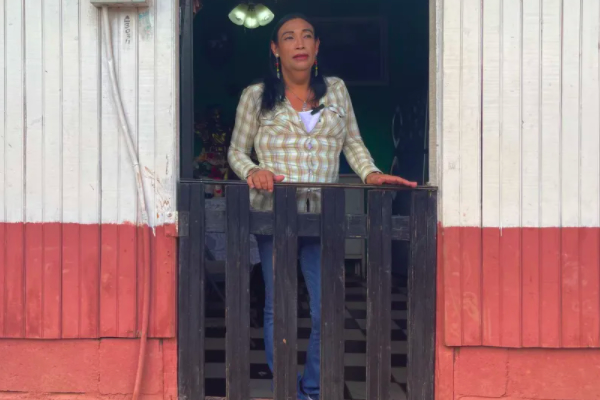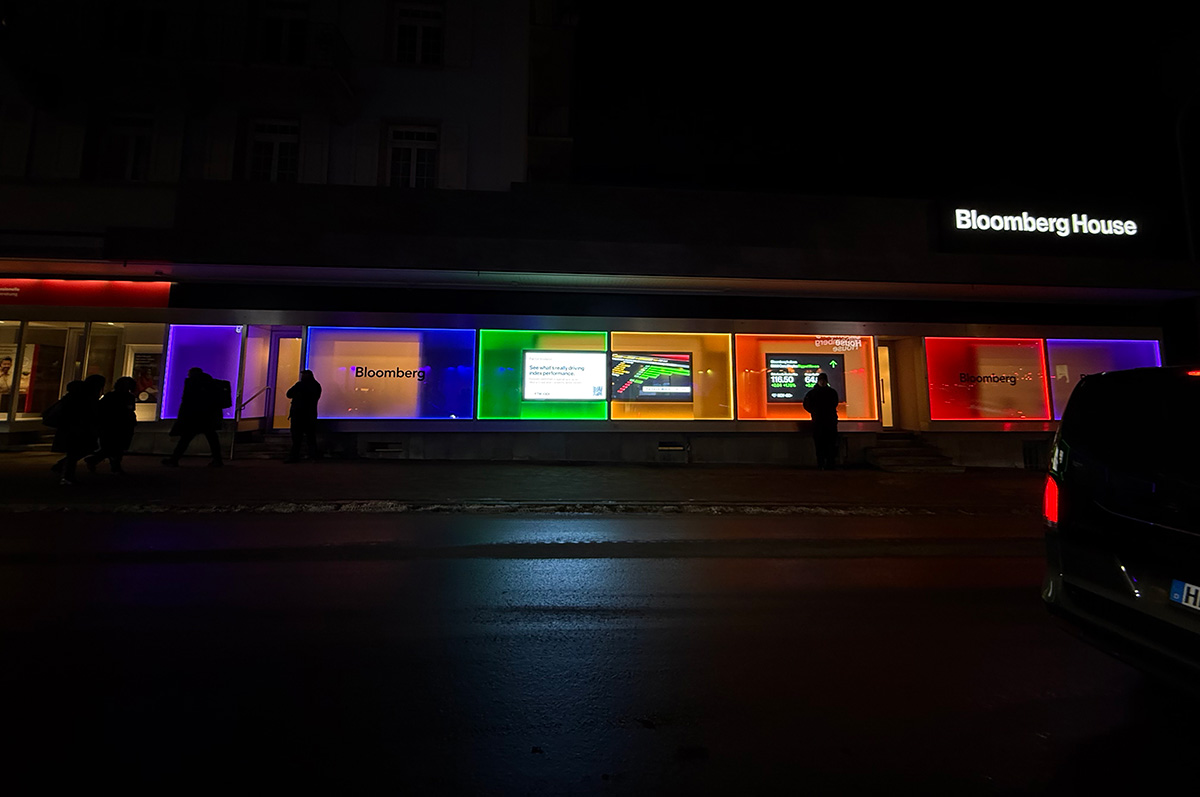World
Prominent transgender activist murdered in Honduras
Thalía Rodríguez killed outside her Tegucigalpa home on Monday

A prominent transgender activist in Honduras was killed on Monday.
Reportar sin Miedo, the Washington Blade’s media partner in Honduras, reported Thalía Rodríguez was shot in the head outside her home in Tegucigalpa, the country’s capital.
Rodríguez, 58, led Asociación Cozumel Trans, a Honduran trans rights group.
Reportar sin Miedo reported Rodríguez ran her own business for nearly three decades until debts, poor sales and the pandemic forced her to close it about a year ago. Reportar sin Miedo interviewed Rodríguez for a feature story on trans Hondurans’ experiences in the country that it published last month.
“Thalía for many years had been fighting to ensure the trans community in Honduras would have rights,” JLo Córdova of Muñecas de Arcoíris, a Honduran trans rights group, told Reportar sin Miedo. “She was a warrior because she always fought for our rights. We condemn and repudiate her murder.” Ferrera, the co-founder of Asociación Cozumel Trans who the Blade interviewed in Tegucigalpa in 2017, also condemned Rodríguez’s murder.
The U.S. Embassy in Honduras has also condemned Rodríguez’s murder.
“We mourn the murder of trans activist and leader Thalía Rodríguez,” tweeted the embassy on Tuesday. “We remain committed to ending violence, discrimination, criminalization and stigma against LGBTQI+ people. We call for an immediate and transparent investigation.”
The U.S. Embassy in #Honduras condemns #ThalíaRodríguez‘s murder on Monday in Tegucigalpa. “We remain committed to putting an end to violence, discrimination, criminalization and stigma against LGBTQI+ people. We call for an immediate and transparent investigation.” @WashBlade https://t.co/dgDKDC6gmB
— Michael K. Lavers (He/Él) (@mklavers81) January 11, 2022
Anti-trans violence is commonplace in Honduras, a country in Central America’s Northern Triangle that borders Guatemala, El Salvador and Nicaragua.
Reportar sin Miedo reports Rodríguez is the 400th trans person to be reported killed in Honduras since 2009.
The Inter-American Court of Human Rights last year found Honduras responsible for the murder of Vicky Hernández, a trans woman who was killed hours after the 2009 coup that ousted then-President Manuel Zelaya. President-elect Xiomara Castro, who is Zelaya’s wife, is scheduled to take office on Jan. 27.
Honduras
Corte IDH reconoce a Thalía Rodríguez como familia social de Leonela Zelaya
Se construyeron una familia tras más de una década de convivencia

Por DORIS GONZÁLEZ * | TEGUCIGALPA, Honduras — En la sentencia del caso Leonela Zelaya y otra vs Honduras emitida por la Corte Interamericana de Derechos Humanos se estableció un hito jurisprudencial para las personas LGBTQ en Honduras, así como en la región en relación a las diversas conformaciones de familias existentes. La Corte IDH interpretó por primera vez el concepto de familia social, indicando que la construcción de familia no debe restringirse a la familia nuclear o a nociones tradicionales, bajo el entendido de que hay diferentes formas en las que se materializan los vínculos familiares.
Este análisis se trae a colación debido al contexto de discriminación, prejuicio y violencia que atravesamos las personas LGBTQ, el cual se puede manifestar incluso dentro de nuestras propias familias. Esta violencia se manifiesta a través de actos de odio como ser el desarraigo familiar, violencia física, psicológica, social, económica, expulsiones de los hogares, violaciones correctivas e incluso, culminando en muertes violentas. Esta violencia motivada por la orientación sexual, identidad y expresión de género de las personas imposibilita la convivencia familiar.
Ante esto, las personas LGBTQ construimos vínculos sociales fuera del vínculo familiar tradicional, los cuales a través de la convivencia, amistad, apoyo económico-social y construcción de vida en común constituyen familias, tal como ocurrió en este caso.
Tras el abandono de su familia biológica, Leonela Zelaya y Thalía Rodríguez construyeron una familia tras más de una década de convivencia, en los cuales se apoyaron mutuamente en diversas situaciones, viviendo como mujeres trans, portadoras de VIH, ejerciendo el trabajo sexual y en situación de pobreza, enfrentando constantes episodios de detenciones arbitrarias y violentas por parte de los órganos policiales.
Tras su asesinato, fue Thalía quien recogió el cuerpo de Leonela en la morgue de Tegucigalpa y quien gestionó el féretro a través de la Funeraria del Pueblo. Los servicios fúnebres de Leonela Zelaya fueron realizados en un bar por mujeres trans, trabajadoras sexuales, al cual no asistió ningún miembro de su familia biológica.
El asesinato de Leonela y la falta de esclarecimiento generaron a Thalía un sentimiento de inseguridad, frustración e impotencia. Por estas violaciones de derechos humanos, la Corte reconoció a Thalía Rodríguez, en calidad de familiar de Leonela, como víctima del caso, generando estándares aplicables a todas las personas LGBTQ.
A juicio de la Corte, esta situación lleva a que, en casos de muertes violentas de mujeres trans, las personas que integren las redes de apoyo de la persona fallecida puedan ser declaradas víctimas por la violación de sus derechos a la integridad psíquica o moral, siempre que se acredite la existencia de un vínculo estrecho con la víctima y una afectación a sus derechos, derivada, por ejemplo, de las gestiones realizadas para obtener justicia. Esta sentencia logra reconocer que las personas LGBTQ construimos familias sociales, familias elegidas, e indica que estas deben ser reconocidas y validadas.
* Abogada litigante del caso Leonela Zelaya y otra vs Honduras, Red Lésbica Cattrachas
Uganda
LGBTQ Ugandans targeted ahead of country’s elections
President Yoweri Museveni won 7th term in disputed Jan. 15 vote

Barely a week after Ugandan President Yoweri Museveni secured a 7th term in an election marred by state violence, intimidation, and allegations of fraud, the country’s queer community spoke about how the election environment impacted it.
The LGBTQ lobby groups who spoke with the Washington Blade noted that, besides government institutions’ failure to create a safe and inclusive environment for civic participation by all Ugandans, authorities weaponized the Anti-Homosexuality Act to silence dissent and discourage queer voter engagement.
The rights groups note that candidates aligned with Museveni’s ruling National Resistance Movement — including Parliament Speaker Anita Among — during the campaigns accused their rivals of “promoting homosexuality” to discredit them while wooing conservative voters.
Queer people and LGBTQ rights organizations as a result were largely excluded from the formal political processes for the election as voters, mobilizers, or civic actors due to fear of exposure, stigma, violence, and legal reprisals.
“This homophobic rhetoric fueled public hostility and emboldened vigilante violence, forcing many queer Ugandans into deeper hiding during the election period,” Uganda Minority Shelters Consortium Coordinator John Grace stated.
Some queer people had expressed an interest in running for local council seats, but none of them formally registered as candidates or campaigned openly because of safety concerns and local electoral bodies’ discriminatory vetting of candidates.
“UMSC documented at least three incidents of election-related violence or intimidation targeting LGBTQ+ individuals and activists,” Grace noted. “These included harassment, arbitrary detentions, extortions by state and non-state actors, digital cat-fishing, and threats of outing.”
Amid such a militarized and repressive election environment, Let’s Walk Uganda Executive Director Edward Mutebi noted queer-led and allied organizations engaged in the election process through restricted informal voter education, community discussions, and documenting human rights violations.
“Fear of backlash limited visibility and direct participation throughout the election cycle,” Mutebi said. “But despite the hostile environment of work, Let’s Walk Uganda was able to organize a successful transgender and gender diverse youth training on electoral security and safety.”
Museveni’s government escalated its repressive actions during the Jan. 15 elections by shutting down the internet and suspending nine civil society organizations, including Chapter Four Uganda and the National Coalition of Human Rights Defenders, for allegedly engaging in activities that are prejudicial to the security and laws of the country.
The suspension of the rights organizations remains in force, an action both Mutebi and Grace condemn. They say it prevents queer Ugandans from accessing urgent services from the affected groups.
“For the LGBTQ community, the impact has been immediate and deeply harmful. Many of the suspended organizations, like Chapter Four Uganda, were critical partners in providing legal representation, emergency response, and documentation of rights violations,” Grace said.
This has compelled UMSC and its other partners to handle increased caseloads with limited resources, while navigating heightened scrutiny and operational risk.
“The suspension has disrupted referral pathways, delayed urgent interventions, and weakened collective advocacy for marginalized groups and minority rights defenders, which calls for urgent international solidarity, flexible funding, and protection mechanisms to safeguard the work of grassroots organizations operating under threat,” Grace stated.
Mutebi warned that such repressive actions are tyrannical and are indicative of shrinking civic space, which undermines democratic accountability as the promotion and protection of human rights is ignored.
With Museveni, 81, extending his tenure at State House from a landslide win of 72 percent, UMSC and LWU consider a bleak future in the protection of rights for queer Ugandans and other minority groups.
“Without significant political and legal shifts, LGBTQ persons will face continued criminalization, reduced civic space, and heightened insecurity, making sustained advocacy and international solidarity more critical than ever,” Mutebi said. “ It is unimaginable how it feels to live in a country with no hope.”
Grace, however, affirmed the resistance by local queer lobby groups will continue through underground networks, regional solidarity, and digital organizing.
The duo noted that a win by Museveni’s main challenger and rapper, Bobi Wine, who only managed 24 percent of the total votes cast, could have enabled the opening up of civil space and human rights protections in Uganda.
Wine, for his part, spoke in favor of the respect for the rule of law and human rights during his campaign.
“While Bobi Wine’s past stance on LGBTQ rights was inconsistent, his recent shift toward more inclusive rhetoric and international engagement suggested a potential opening for dialogue,” Grace said. “A win might have created space for policy reform or at least reduced state-sponsored homophobia, though structural change would still require sustained pressure and coalition-building.”
Mutebi stated that a change in Uganda’s leadership to a youthful leader like Wine could have offered an opening, but not a guarantee for progress on inclusion and human rights. Mutebi added existing institutionalized and societal homophobia remain in place.
World
Companies participate in ‘Pride on the Promenade’ at World Economic Forum
GLAAD co-organized initiative

A dozen companies that are participating in the World Economic Forum on Wednesday lit up their venues on the Davos promenade in rainbow colors.
Amazon, Axios, Bloomberg, Circle, Cisco, Cloudflare, Edelman Trust House, Hub Culture, Salesforce, SAP, Snowflake, and Workday participated in the “Pride on the Promenade” that GLAAD, Open for Business, and the Partnership for Global LGBTIQ+ Equality organized. It is the fourth year the organizations have organized the initiative during the World Economic Forum.
The annual event is taking place this week in the Swiss ski resort town of Davos.
GLAAD CEO Sarah Kate Ellis on Wednesday moderated a panel in which Open for Business CEO Ken Janssens and Iris Bohnet, co-director of the Harvard Kennedy School’s Women and Public Policy Program, among others, participated. President Donald Trump earlier in the day spoke at the World Economic Forum.
“World leaders, corporate executives, and global media are discussing new ways to evolve inclusion and social issues, but leaders in those institutions and our community as a whole need to do more to support LGBTQ people globally,” said Ellis in a statement that GLAAD sent to the Washington Blade on Thursday. “At a time when decades-old alliances are being challenged, the importance of this visible show of solidarity at the largest convening of global decision makers cannot be understated. Inclusion remains a necessary business practice and companies that demonstrate shared values of family and freedom know this helps grow the bottom line.”



















